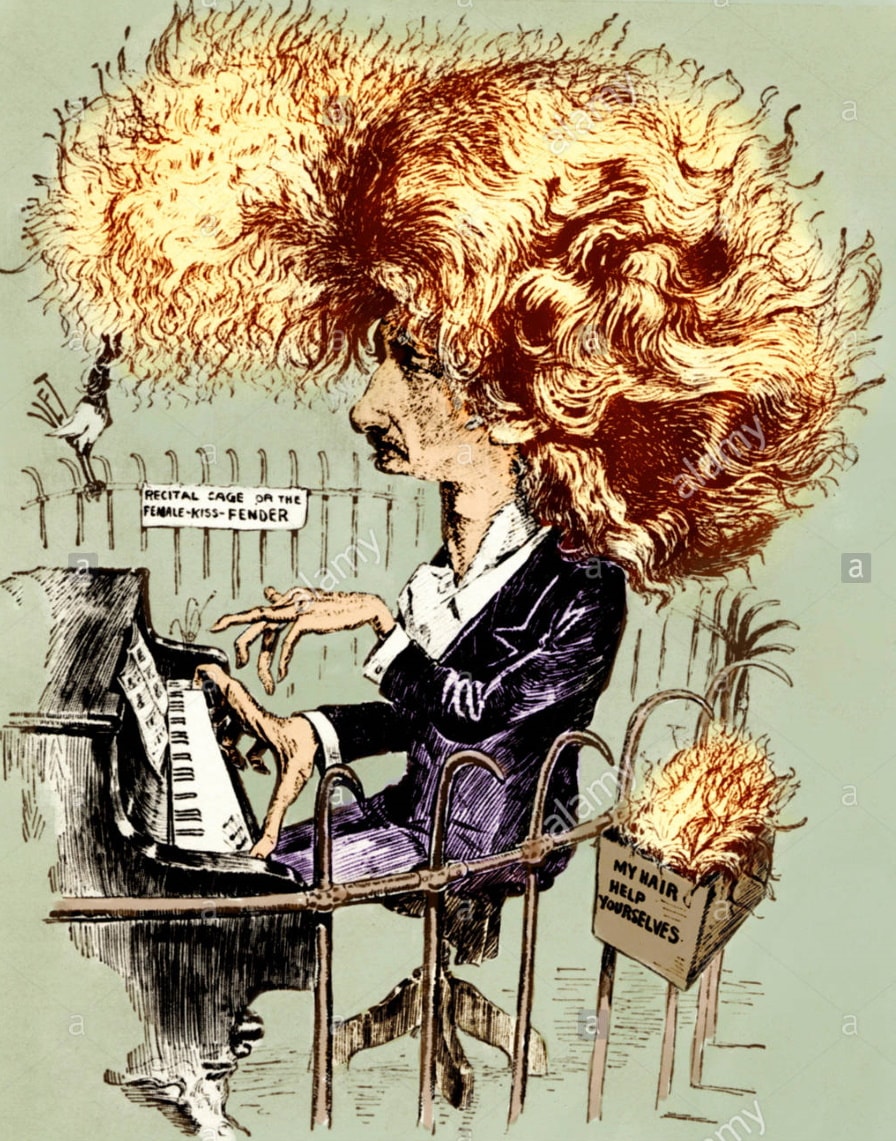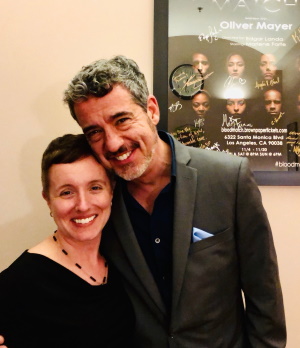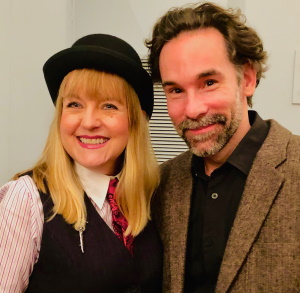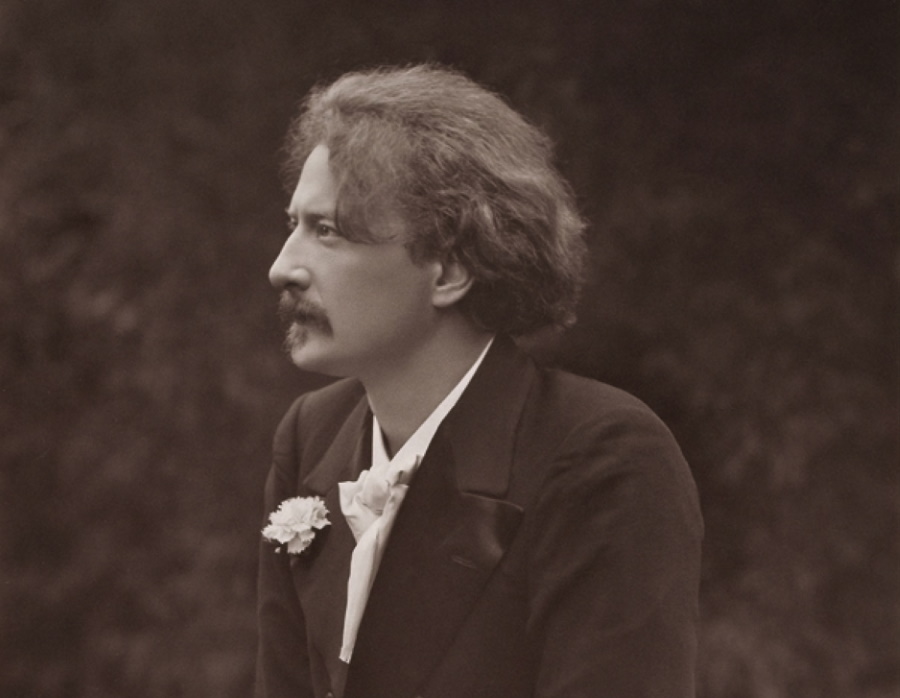Meet Ignacy Jan Paderewski, rock star.
You may have heard the name—Paderewski was, after all, one of the most celebrated public figures of the early 20th century. But U.S. pollsters, were they to veer for a moment from presidential politics, would have a tough time calculating his 2019 approval rating. What’s so special about this Paderewski fellow? And why is he showing up as the leading man in a rash of new musicals being staged at more than a half-dozen U.S. theatres?
Last question first: In a one-of-a-kind competition, the government of Paderewski’s native Poland has commissioned selected teams of American librettists and composers to write original musical works based on the life and legacy of its internationally celebrated favorite son.
The unprecedented initiative—known as the Paderewski Musical Project, and publicized since 2017 in these pages and elsewhere—launched the composition of more than 20 wildly diverse Paderewski-focused musicals, many of which have received stagings or in-progress readings at professional and university theatres across the U.S.
A team of judges for the project recently selected seven of these new works for additional development; three of the winning entries will move forward to full productions this season, while two others are slated for further development and production within the next two years. Some will be staged in Poland as well as in the U.S., and songs from all seven will be featured on a Paderewski-themed CD.
One of the top entries in the competition, Virtuoso—a Broadway-style musical drama by New York-based composer and librettist Matthew Hardy—is being groomed for a commercial mounting in the U.S. Virtuoso will be workshopped in New York City in November, then travel to Poland’s leading performing arts theatre, Teatr Muzyczny of Poznan, for collaborative development with Polish artists. Later in the year, according to Polish sources, the musical will be showcased for an audience that is expected to include the country’s president, Andrzej Duda, and an entourage of Polish cultural observers. (Duda’s controversial coziness with President Donald Trump has brought him to the U.S. repeatedly, most recently for a joint press conference at the White House in June.) Virtuoso’s full-scale premiere is slated for fall 2020 in Poznan, after which it will become available to regional and commercial theatres in the U.S.
Another work from the newly created Paderewski canon—a through-sung opera called Three Paderewskis, with book and lyrics by Oliver Mayer, music by Jenni Brandon, and direction by David Bridel—was chosen in August as a winner of the 2018-19 American Prize in Composition. The opera will be performed in Los Angeles on Oct. 12 at the University of Southern California’s Newman Hall, and will receive its official world premiere on Nov. 20 at the Kennedy Center in Washington, D.C. The Kennedy Center event is a gala to celebrate the 101st anniversary of the regaining of Polish independence in 1918, and the centenary of Polish/American diplomatic relations.
The third top-rated work, Memory Laws (formerly titled Paderewski! Paderewski! Paderewski!), an avant-garde movement work written by Rachel Jendrzejewski and composed by Chris Hepola and Jenna Wyse—developed in cooperation with Tricklock Company of Albuquerque, N.M., and through a residency at Massachusetts’ Mass MoCA arts center—will return to the Tricklock stage Aug. 24 under Emily Mendelsohn’s direction. The show will then travel to the International Theatre Schools Festival in Warsaw, known as “ItSelF,” to perform on Oct. 7.
All three of the aforementioned works have additional, continent-hopping performances on tap.
Musical fragments from all seven selected shows will be performed by Polish musicians and performers at Teatr Muzyczny Oct. 17-19, during a convocation inspired by the Paderewski Musical Project and devoted to the art of musical theatre. Others among the seven selected musicals (see bullet points below) are expected to appear in coming seasons at still-to-be-selected venues in the U.S. and Eastern Europe.

Whenever and wherever Duda and his fellow Poles experience Virtuoso, 3 Paderewskis, or Memory Laws, none of them will be wondering, “Ignacy who?” Nor would you be had you lived in the U.S. approximately a century ago, when the Paderewski name would have been as recognizable to you as that of Presley, Pavarotti, or the Artist Formerly Known as Prince. Indeed, for his time Paderewski had much in common with chart-topping songsters like these: He was a classical-music prodigy whose celebrity outshone and outclassed all competition.
That’s a certifiable claim: His 30 or so wildly popular piano-concert tours to cities across America, beginning in 1891 (and including the first solo performance at Carnegie Hall in New York City), made him the highest-paid musician in the world up to that time.
But Paderewski was more than a rich, irresistibly handsome, wild-haired composer and musician whose concerts generated Beatles-style “Paddy-mania,” particularly among women who lined up for tickets in U.S. cities large and small. The artist was also a statesman and a polymath, destined to make his mark not only in music but in world politics, philanthropy, monument-building, even (wait for it) winemaking.
On the advent of World War I, Paderewski became an active member of the Polish National Committee in Paris, representing the forces working to create the new state of Poland, after 123 years without national sovereignty. On the eve of the U.S. entry into the war, he advised President Woodrow Wilson that there should be “a united, independent, autonomous Poland.” When that goal became a reality in 1919, Paderewski was appointed Prime Minister, representing Poland at that year’s Paris Peace Conference and signing the Treaty of Versailles.
Paderewski also put his considerable wealth to work in incomparably generous ways, making record donations to support veterans after the war and musicians who lost jobs during the Depression, paying for the education of young musicians and artists around the world, creating foundations and charities. And a benefit concert headlined by him raised the lion’s share of the money for the construction of New York’s Washington Square Arch in 1892. His largesse was also behind countless memorials to world peace, progressive political causes, and such musical icons as Debussy, Liszt, Beethoven, and Chopin.
At the height of his fame, perhaps succumbing to the allure of American adoration, Paderewski bought a 2000-acre property on the Central California coast, where he and his second wife lived, tended a Zinfandel vineyard and made wine. An annual performance festival in Paso Robles still kindles the Paderewski flame. Upon his death at age 80 in 1941, Paderewski was laid to rest with honors in Arlington National Cemetery in Virginia. (His body was returned to Warsaw 51 years later, in 1992, under the administration of George H. W. Bush, an event unnoticed in the U.S. but met in Poland with a raucous national celebration.)
It’s a résumé of uncommon distinction, but time erodes both celebrity and historical memory. The folks at the Adam Mickiewicz Institute (AMI), a government-funded cultural outreach organization based in Warsaw, think they have an antidote.
“Paderewski is a figure that should unite us all—right-wing, left-wing, upper or lower wing,” quipped Krzysztof Olendzki, director of AMI since 2016, during a recent interview in New York City, where he was meeting with project planners and participants. “He wasn’t a saint, but he represents values cherished in both our nations—he was hard-working, patriotic, inventive, humble, eager to be of public service rather than trying to enrich himself or grab power.
“He also had high respect for women,” Olendzki was quick to add, building a character portrait with unspoken but undeniable contrasts to the age of Trump. “Paderewski’s lifelong mentor was the great Polish artist and intellectual Helena Modjeska, an extremely powerful and independent woman, and they helped each other in remarkably modern ways. His second wife—the first died in childbirth—was another Helena, Helena Górska, who cared for his ill son. This is not only a story about a sort of perfect marriage, it’s about giving women autonomy and universal rights.”
It was Olendzki’s colleague Joanna Klass who came up with the concept of a Paderewski musical competition and helped convince not only her AMI colleagues but members of the Polish Parliament that it was a project worth bankrolling. Her unprecedented plan to engage American authors, artists, producers, and audiences in the Paderewski story has the aim, she avowed, of “rediscovering and reimagining him as an utterly universal (yet very American) hero, an immigrant, a self-made man who came from humble origins.”
Is that a call for the Paderewski name to materialize on a Broadway marquee down the street from Hamilton? “It’s entirely possible,” Klass allowed, despite the odds. “There are thousands of musicals being developed and produced right now in the U.S., but the form is not so prevalent in Poland.” (A rare imported Polish tuner called Metro did take a shot at Broadway in the ’90s but roundly flopped.) “That made the idea of turning to contemporary American artists all the more interesting and appealing. We’re engaging artists in another hemisphere, another culture, in order to find common threads in our history.”
More than 100 American artists of every stripe have immersed themselves in the venture thus far. Initial concert presentations of first-act excerpts from multiple shows got the ball rolling in late 2017 on both coasts, in showcase evenings at New York’s Public Theater and at USC’s Cammilleri Hall. In late 2018, Olendzki, Klass, several Polish observers, and a team of evaluators (this writer included) traveled as a group to four U.S. cities—New Orleans, Los Angeles, Albuquerque, N.M., and New York City—to witness in-progress stagings of the seven musicals selected for fuller development.
A rundown of the tour illuminates the variety of narrative riches embedded in the Paderewski canvas:
- The young hero’s love affairs with women (including his future wife) are highlighted with wit and aplomb in Hardy’s Virtuoso, energetically staged at New Orleans’ Contemporary Arts Center under educator Laura Hope’s direction. Next stops: Teatr Muzyczny, Poznan, fall 2020, full-scale premiere production. A commercial U.S. mounting is expected to follow.
- Writer JendrzejEwski characterized her Memory Laws, elegantly staged by director Emily Mendelsohn at Albuquerque’s Tricklock Company, as “an album, a constellation, a collage of vignettes” evoking Paderewski’s life, though the man himself appears only in film images. A cast of three women in white reinforce the piece’s female-centered approach. Next stops: a return to Tricklock, Aug. 25; “ItSelF” in Warsaw, Oct. 7.
- Not one but three incarnations of Paderewski (racial or gender specificity not required) was the out-of-the-box trope that made the Brandon-Mayer collaboration Three Paderewskis. This set-free chamber opera for nine singers was staged with effective simplicity on the USC campus by Jon Lawrence Rivera. Next stops: a return to Los Angeles, Oct. 12; Kennedy Center gala premiere, Nov. 20.
- The later California-based years of Paderewski and spouse are surveyed in Golden, a musically rich tale (score by Nathan Wang, book and lyrics by Paula Cizmar) that veers disconcertingly into issues of American racial violence. Diana Wyenn helmed the staging at USC. Next stop for Wang (best known for his soundtracks for films of Steven Spielberg and Jackie Chan): a residency at Huntington Gardens in Pasadena, Calif., which holds a major collection of letters from Paderewski’s close friend and mentor, the great Shakespearean actor Modjeska. A production in China, aimed at Wang’s enthusiastic Asian fan base, is also under discussion.
- A star performance by Black actor Bryan Terrell Clark highlighted the hip-hop flavored 13th Point, with book and lyrics by Jeremy J. Kamps and music by Christian “Chopper” Jacobs. Logan Vaughn directed at Los Angeles’ Geffen Playhouse. Next stop: TimeLine Theatre of Chicago for further development.
- Director and book writer Mark Seldis, lyricist and co-writer Katharine Noon, and composer David O are the creative team for Paderewski in America, which throws its hero into an unlikely but evocative conversation with the madam of a St. Louis brothel. Also presented at the Geffen.
- Blacksmith, which takes its title from a critic’s disparaging comment about the pianist’s style, sets Paderewski’s career track to a pounding rock score and lyrics by Zoe Sarnak, whose collaborators included James Fluhr (concept and book) and Ellie Heyman (director). Shown at Manhattan’s Public Arts Theatre. Next stop: a CD of Sarnak’s Blacksmith.

“I’m not a musical-theatre specialist—I’m a diplomat—but I’m convinced that these musicals are not just products to sell but also tools of diplomacy,” observes AMI’s Olendzki, who is up-front about his hopes that the project can help forge a deeper and more purposeful bond between the citizens of Poland, longtime admirers of American-style democracy, and those of the U.S. “Culture is a fundamental element of human rights, and this is a way to share our national culture, our national music, and an important era of history that forever sealed our mutual interests.”

Klass offers a somewhat testier rationale. “We started this project in darkening times,” she acknowledges. “In 2016 the nations of Europe seemed to be polarized, societies were almost fighting among themselves. Paderewski is a redemptive example for our times. We want to register strongly on the American cultural map, and to foster public awareness of his achievements. What more fitting celebration of the centenary of Polish independence?”
A movie, perhaps? Olendzki posits, “Well, musicals on film and TV have seen a creative resurgence—think of La La Land—but it’s also a great time on the American theatrical stage for the historical musical. We think that may be the right form of artistic expression to reach audiences in a troubled and uncertain period.” As Olendzki sees it, a stage work creates its own kind of permanence. “This group of artists involved in the Paderewski Musical Project will remember what they’ve learned about the man and his country for the rest of their lives. And they’ll have created permanent works that will be around generation after generation.”
Klass, whose favorites among these new musicals are those that boast a sense of humor and a touch of the absurd, cites some favorite film sources as inspiration for the project. “Think of the Marx Brothers in their operetta mode—the tale they’re telling may be dark, but they make it funny. I also admire Mel Brooks’s treatment of history—remember his To Be or Not to Be, set in Poland? He treats history with the kind of irreverence and political incorrectness that I love (as opposed to the one exhibited recently in official politics). I think when we open our Paderewski musical in New York, Mr. Brooks must come to the premiere!”
As Klass has conceived the project, of course, audiences may not need to head to NYC to catch the premiere of a new Paderewski musical. Taking her cue from the peripatetic Polish patriot himself, Klass has set out to multiply the impact of the Paderewski story and spread it around the globe. Curtains up.
Jim O’Quinn is the founding editor of this magazine. Alongside Carol Martin, Boo Froebel, Mark Russell, and Eva Sobolevski, he is serving as an evaluator for the Paderewski Musical Project competition.


